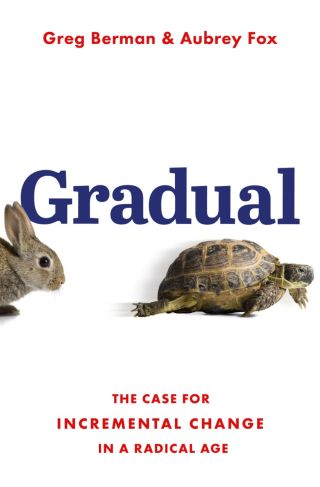Politics
Taking the Turtle Approach to Public Policy Change
Why incremental change in a radical age is underappreciated.
Posted May 23, 2023 Reviewed by Abigail Fagan
Key points
- The new book “Gradual” makes the case that incremental change can best improve public policy.
- Several successful policy reforms unfolded incrementally, such as Social Security.
- A recent survey suggests that the public often doesn’t prefer transformative change.
Seemingly small changes in a positive direction can add up over time if you take the long view. This matters for exercise and diet as it does for compounding interest. And yet, when it comes to expectations of policy change, we often expect, or at least hope for, a quick fix. What if incremental change is underappreciated to really improve public policy?
Greg Berman and Aubrey Fox make the case for incremental change in a radical age in their new book Gradual. In a polarized political climate where the loudest voices on social media seem so extreme, perhaps having a long time horizon and making positive changes over time can add up to real change to help people. They advocate for the turtle approach to public policy in a rabbit age. Greg and Aubrey kindly responded to a few questions about their new book for this post.
Why did you write this book?
Greg Berman and Aubrey Fox: The two of us have spent the past 30 years working to reform the justice system. This has included managing two large nonprofit organizations (NYC’s Criminal Justice Agency and the Center for Justice Innovation). We’ve also worked with hundreds of government officials – judges, attorneys, probation officers, police officials and more. Over the years, we’ve learned a number of lessons about how change happens – and how it doesn’t.
In our experience, most people working in government are trying the best they can. They are being asked to solve enormously complex problems – things like poverty and racism and homelessness and unequal educational outcomes. We have seen first-hand how difficult this work is. These are wicked problems that do not lend themselves to easy solutions.
At the same time, we have also seen that government officials are achieving small wins almost every day. Unfortunately, these victories are not the kind of thing that typically merits coverage in the New York Times. But we believe these small victories are significant because, if they continue to accumulate over a long enough time period, they can add up to something transformational.
So we wrote Gradual to make the case that the best approach to achieving change is to take the long view and to try to build incrementally. This is particularly important given the current polarized political landscape, where support for our two primary political parties is so evenly balanced.
For radical friends, we hope the book will explain a different way of looking at the world. And for readers who are already inclined to agree with us, we hope the book will encourage them to be more full-throated in their public support for incrementalism.
What can we learn from the history of policy reform?
In the book, we tell the stories of several successful policy reforms that unfolded incrementally, including some that might surprise you, like the development of Social Security. Social Security was intentionally rolled out slowly over the course of more than a decade. The program model, where benefits are linked to a payroll tax, was also explicitly selected by FDR’s administration over a more radical option that a grassroots movement was advocating for.
More recently, NYC has successfully reduced both crime and incarceration. In the early 1990s, the city’s murder rate peaked with more than 2,000 per year. The average daily jail population also peaked with more than 22,000 people on Rikers Island and other city jails. When we looked at the numbers, the average daily jail population was about 5,500 people and there were roughly 440 murders annually in NYC. That’s a big change!
When it comes time to hand out credit for accomplishments like these, there is often a tendency to look for silver bullet answers – the one crucial technological improvement or political choice that made the difference. Our argument is that the NYC success stories are the product of numerous small improvements that happened over the course of a generation, both inside and outside of the criminal justice system.
The two of us were small participants in this process, helping to create and administer alternative-to-incarceration programs that worked with thousands of New Yorkers. We learned from the experience that change is in fact possible. There’s a lot of doom and gloom these days. It’s easy to come away from Twitter thinking that nothing has ever gotten better. That’s just not true.

Why is incremental change underappreciated?
For whatever reason, radical change is currently all the rage. As we have discussed our book, we have encountered a fair amount of pushback. On a recent radio call-in show, we were admonished by several callers who told us that we were on the wrong side of history and that we needed to “get out of the way.”
As it did on that day, the argument for radical change typically begins with a review of the greatest accomplishments of progressive reform. The abolition of slavery and the campaign for women’s rights are just two examples of the kind of game-changing improvements that would not have been possible without the activism of radical change agents.
Fair enough. But it’s also worth noting that many of the most cherished progressive victories did not happen overnight in one fell swoop. Rather, they were the product of years of step-by-step (some would say incremental) work. For example, Jonathan Rauch, the author of Gay marriage: Why it is good for gays, good for straights, and good for America credits the victory of same-sex marriage to decades of trial and error as advocates worked on crafting winning messages and building bigger coalitions.
Our argument is not that radical change has never happened or is never necessary. Rather, in the vast majority of cases, incremental change is the best way for government to address social problems.
Government must always be mindful of the law of unintended consequences. One of the hallmarks of gradualism is an appreciation for the reality that any move that the government makes is likely to create unanticipated effects. Not every reform idea is a good one after all. Eugenics and prohibition were once embraced by some progressive reformers. Slum clearance sought to improve cities by redeveloping “blighted” urban areas. But it ended up being abandoned for multiple reasons, including the fact that it had the unintended effect of destroying cohesive neighborhoods in the process.
And then there’s the problem of backlash. There’s precious little evidence to suggest that the general public is hungering for transformative change. For our book, we commissioned a survey of 1,000 registered voters which revealed that only one-third of respondents supported the idea of government making big changes. The majority of respondents favored incremental change or preserving the status quo. Pushing through major change without broad public support is a recipe for upheaval. Incrementalism is our best hope of solving social problems without incurring debilitating political backlash.
References
Berman, G., & Fox, A. (2023). Gradual: The case for incremental change in a radical age. Oxford University Press.




